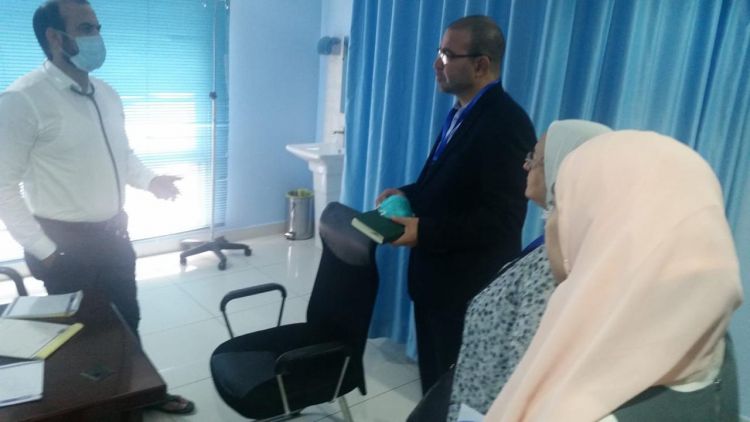 A joint team from WHO and Kuwait’s Ministry of Health speak with the physician who treated the Korean MERS patient. (Photo: WHO)
A joint team from WHO and Kuwait’s Ministry of Health speak with the physician who treated the Korean MERS patient. (Photo: WHO)
10 October 2018 - In a globalized world, infectious disease outbreaks can travel between countries within hours, potentially becoming a concern for the entire world. When a 61-year old Korean man was diagnosed with the deadly Middle East respiratory syndrome (MERS) in the Republic of Korea (RoK) on September 9, after returning from a trip to Kuwait, this was exactly the scenario that many people feared. The recent memory of 186 cases and 36 deaths that occurred in the Republic of Korea’s 2015 outbreak further added to this fear.
Since the emergence of MERS-CoV in 2012, there have been over 2400 laboratory-confirmed cases of MERS, most of them in Saudi Arabia. Despite these numbers, which pale in comparison to other epidemics, and despite the absence of sustained human-to-human transmission, MERS continues to present a high potential risk because of its high mortality rate: MERS kills over one third of the people it infects.
While Korean and international media began reporting on the imported case, in the background WHO and government public health experts swiftly kicked into gear. As soon as the diagnosis of MERS was confirmed, the National Focal Point of RoK for International Health Regulations immediately notified the World Health Organization’s Regional Offices in Manila (for the Western Pacific Region, or WPRO) and Cairo (for the Eastern Mediterranean Region, or EMRO) of this laboratory-confirmed case. The information was also communicated to the National Focal Point of IHR in Kuwait. .
The WHO Eastern Mediterranean Regional Office deployed a technical mission to Kuwait to assist the ministry of health to investigate the source of infection of the imported case, as well as take appropriate public health measures to stop transmission. As part of the field investigation, anyone who may have come into contact with the MERS patient within 7-10 days of developing symptoms were identified.
In total, 60 close contacts of the MERS patient were identified. Their health was closely monitored by the government health authority of Kuwait for 14 days since their contact with the MERS patient, and they were all tested for MERS-CoV. In the end, none of the close contacts tested positive for MERS-CoV and none developed clinical symptoms suggestive of MERS.
Despite the detailed field investigation and other response measures which were quickly put in place, the original source of this imported MERS case remains unclear. In order to detect and identify any sub-clinical infection or silent transmission of the virus, WHO’s Eastern Mediterranean Regional Office will work with Kuwait’s Health Ministry on a further sero-epidemiological survey amongst the patient’s close contacts. This additional investigation could unearth unnoticed or past infections, and help identify other risk factors.
In the end, thanks to the systems put in place by governments around the world, supported by WHO, a potentially devastating international outbreak of MERS was averted.








